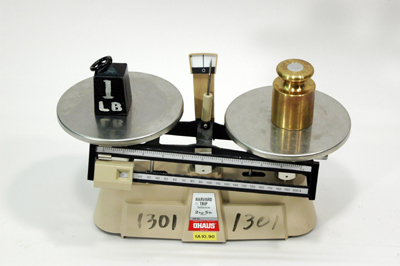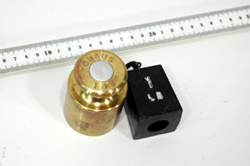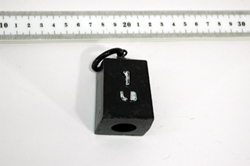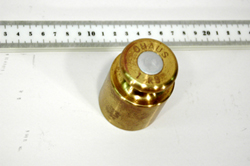|
Size: 1646
Comment:
|
Size: 2561
Comment:
|
| Deletions are marked like this. | Additions are marked like this. |
| Line 2: | Line 2: |
| ||<:30%>[:PiraScheme#Mechanics: Table of Mechanics Demonstration]||<:30%>[:MEEquipmentList: List of Mechanics Equipment & Supplies]||<:30%>[:Demonstrations:Lecture Demonstrations]|| | ||<30% style="text-align:center">[[PiraScheme#Mechanics|Table of Mechanics Demonstration]] ||<30% style="text-align:center">[[MEEquipmentList|List of Mechanics Equipment & Supplies]] ||<30% style="text-align:center">[[Demonstrations|Lecture Demonstrations]] || |
| Line 4: | Line 4: |
| =Standard Masses, 1A10.20= |
= Standard Masses, 1A10.20 = '''Topic and Concept:''' . Measurement, [[Measurement|1A10. Basic Units]] '''A PIRA-200 Item''' |
| Line 7: | Line 13: |
| * '''Cabinet:''' [:MechanicsCabinet:Mechanic (ME)] * '''Bay:''' [:MechanicsCabinetBayA3:(A3)] |
* '''Cabinet:''' [[MechanicsCabinet|Mechanic (ME)]] * '''Bay:''' [[MechanicsCabinetBayA3|(A3)]] |
| Line 11: | Line 18: |
| attachment:StandardMasses-03-400.jpg | {{attachment:BasicUnits-03-400.jpg}} |
| Line 13: | Line 20: |
| '''Description:''' | '''Abstract:''' |
| Line 16: | Line 23: |
||<:style="width: 60%" :40%>'''Equipment'''||<:30%>'''Location'''||<:25%>'''ID Number'''|| |
||<40% style="text-align:center">'''Equipment''' ||<30% style="text-align:center">'''Location''' ||<25% style="text-align:center">'''ID Number''' || |
| Line 19: | Line 25: |
| ||apparatus||ME, Bay B1, Shelf #2|| || ||all other parts||ME, Bay B1, Shelf #2|| || ||...||ME, Bay B1, Shelf #2|| || ||Possible supplies that are needed||Rode and Tack Cabinet|| || ||...|| In Lecture Halls|| || ||...|| Stock Cabinet || || ||...|| Stock Cabinet || || '''''Important Setup Notes:''''' A. '''''This demonstration requires a minimum 24 hour notice.''''' * '''''This demonstration requires LN2''''' * '''''Back-to-Back lectures is NOT possible; We'll do one lecture one day and the other the next day.''''' |
||1 lb Mass ||ME, Bay [[MechanicsCabinetBayA3|A3]], Shelf #1 || || ||1 kg Mass ||ME, Bay [[MechanicsCabinetBayB1|B1]], Shelf #3 || || ||Double Pan Balance ||ME, Bay [[MechanicsCabinetBayB2|B2]], Shelf #2 || || ||Standard Mass Set ||ME, Bay [[MechanicsCabinetBayA1|A1]], Shelf #4 ||[[StandardMassSet|1A10.21]] || |
| Line 33: | Line 31: |
| '''Setup:''' | |
| Line 35: | Line 32: |
| 1. Make a Setup check list. 1. ... |
'''''Important Setup Notes:''''' * N/A '''Setup and Procedure:''' 1. Set out the above equipment. 1. Compare the 1 lb mass to a 1 kg mass, by placing the one pound mass on a balance with the equivalent mass in grams on the other side. |
| Line 39: | Line 43: |
| 1. List any Warnings.... 1. Demonstration may require practice. |
* N/A '''Discussion:''' A 1 lb mass and a 1 kg mass is set out for the students to compare. One can use a double pan balance to compare there mass. The SI unit of mass, the kilogram, is defined as the mass of a specific platinum iridium alloy cylinder kept at the International Bureau of Weights and Measures at Sevres, France. This mass standard was established in 1901, and there has been no change since that time because platinum iridium is an unusually stable alloy. The Sevres cylinder is 3.9 centimeters in diameter and 3.9 centimeters in height. A duplicate is kept at the National Bureau of Standards in Gaithersburg, Md. || {{attachment:StandardMasses-03-250.jpg}} || {{attachment:1LBMass-01-250.jpg}} || {{attachment:KGMass-02-250.jpg}} || |
| Line 43: | Line 54: |
| '''Demonstration:''' | |
| Line 45: | Line 55: |
| Insert description of demonstration, how is the demonstration preformed. | |
| Line 47: | Line 56: |
| ||attachment other photos||attachment other photos|| ||attachment other photos||attachment other photos|| |
'''Videos:''' * [[https://www.youtube.com/user/LectureDemostrations/videos?view=1|Lecture Demonstration's Youtube Channel]] |
| Line 52: | Line 62: |
| 1. List any references | * [[http://www.nist.gov/index.html|National Institute of Standards and Technology's web site]] |
| Line 54: | Line 64: |
[:Instructional:Home] |
[[Instructional|Home]] |
Standard Masses, 1A10.20
Topic and Concept:
Measurement, 1A10. Basic Units
A PIRA-200 Item
Location:
Cabinet: Mechanic (ME)
Bay: (A3)
Shelf: #1

Abstract:
Show students a 1 lb mass and a 1 kg mass.
Equipment |
Location |
ID Number |
|
|
|
1 lb Mass |
ME, Bay A3, Shelf #1 |
|
1 kg Mass |
ME, Bay B1, Shelf #3 |
|
Double Pan Balance |
ME, Bay B2, Shelf #2 |
|
Standard Mass Set |
ME, Bay A1, Shelf #4 |
Important Setup Notes:
- N/A
Setup and Procedure:
- Set out the above equipment.
- Compare the 1 lb mass to a 1 kg mass, by placing the one pound mass on a balance with the equivalent mass in grams on the other side.
Cautions, Warnings, or Safety Concerns:
- N/A
Discussion:
A 1 lb mass and a 1 kg mass is set out for the students to compare. One can use a double pan balance to compare there mass.
The SI unit of mass, the kilogram, is defined as the mass of a specific platinum iridium alloy cylinder kept at the International Bureau of Weights and Measures at Sevres, France. This mass standard was established in 1901, and there has been no change since that time because platinum iridium is an unusually stable alloy. The Sevres cylinder is 3.9 centimeters in diameter and 3.9 centimeters in height. A duplicate is kept at the National Bureau of Standards in Gaithersburg, Md.
|
|
|
Videos:
References:


